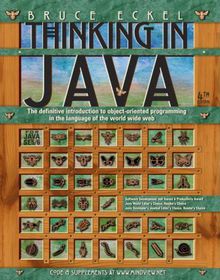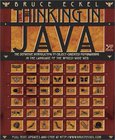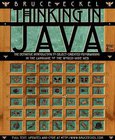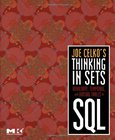Thinking in Java
4th Edition

Book Details:
| Publisher: | Prentice Hall |
| Series: | Prentice Hall |
| Author: | Bruce Eckel |
| Edition: | 4 |
| ISBN-10: | 0131872486 |
| ISBN-13: | 9780131872486 |
| Pages: | 1150 |
| Published: | Feb 20 2006 |
| Posted: | Nov 19 2014 |
| Language: | English |
| Book format: | |
| Book size: | 4.88 MB |
Book Description:
'Thinking in Java should be read cover to cover by every Java programmer, then kept close at hand for frequent reference. The exercises are challenging, and the chapter on Collections is superb! Not only did this book help me to pass the Sun Certified Java Programmer exam; it's also the first book I turn to whenever I have a Java question. Jim Pleger, Loudoun County (Virginia) Government 'Much better than any other Java book I've seen. Make that by an order of magnitude'.... Very complete, with excellent right-to-the-point examples and intelligent, not dumbed-down, explanations.... In contrast to many other Java books I found it to be unusually mature, consistent, intellectually honest, well-written, and precise. IMHO, an ideal book for studying Java. Anatoly Vorobey, Technion University, Haifa, Israel 'Absolutely one of the best programming tutorials I've seen for any language. Joakim Ziegler, FIX sysop 'Thank you again for your awesome book. I was really floundering (being a non-C programmer), but your book has brought me up to speed as fast as I could read it. It's really cool to be able to understand the underlying principles and concepts from the start, rather than having to try to build that conceptual model through trial and error. Hopefully I will be able to attend your seminar in the not-too-distant future. Randall R. Hawley, automation technician, Eli Lilly Co. 'This is one of the best books I've read about a programming language.... The best book ever written on Java. Ravindra Pai, Oracle Corporation, SUNOS product line 'Bruce, your book is wonderful! Your explanations are clear and direct. Through your fantastic book I have gained a tremendous amount of Java knowledge. The exercises are also fantastic and do an excellent job reinforcing the ideas explained throughout the chapters. I look forward to reading more books written by you. Thank you for the tremendous service that you are providing by writing such great books. My code will be much better after reading Thinking in Java. I thank you and I'm sure any programmers who will have to maintain my code are also grateful to you. Yvonne Watkins, Java artisan, Discover Technologies, Inc. 'Other books cover the what of Java (describing the syntax and the libraries) or the how of Java (practical programming examples). Thinking in Java is the only book I know that explains the why of Java: Why it was designed the way it was, why it works the way it does, why it sometimes doesn't work, why it's better than C++, why it's not. Although it also does a good job of teaching the what and how of the language, Thinking in Java is definitely the thinking person's choice in a Java book. Robert S. Stephenson Awards for Thinking in Java 2003 Software Development Magazine Jolt Award for Best Book2003 Java Developer's Journal Reader's Choice Award for Best Book2001 JavaWorld Editor's Choice Award for Best Book2000 JavaWorld Reader's Choice Award for Best Book1999 Software Development Magazine Productivity Award1998 Java Developer's Journal Editor's Choice Award for Best Book Thinking in Java has earned raves from programmers worldwide for its extraordinary clarity, careful organization, and small, direct programming examples. From the fundamentals of Java syntax to its most advanced features, Thinking in Java is designed to teach, one simple step at a time. The classic object-oriented introduction for beginners and experts alike, fully updated for Java SE5/6 with many new examples and chapters! Test framework shows program output. Design patterns are shown with multiple examples throughout: Adapter, Bridge, Chain of Responsibility, Command, Decorator, Facade, Factory Method, Flyweight, Iterator, Data Transfer Object, Null Object, Proxy, Singleton, State, Strategy, Template Method, and Visitor. Introduction to XML for data transfer; SWT, Flash for user interfaces. Completely rewritten concurrency chapter gives you a solid grasp of threading fundamentals. 500+ working Java programs in 700+ compiling files, rewritten for this edition and Java SE5/6. Companion web site includes all source code, annotated solution guide, weblog, and multimedia seminars. Thorough coverage of fundamentals; demonstrates advanced topics. Explains sound object-oriented principles. Hands-On Java Seminar CD available online, with full multimedia seminar by Bruce Eckel. Live seminars, consulting, and reviews available. See www.MindView.net Download seven free sample chapters from Thinking in Java, Fourth Edition. Visit http://mindview.net/Books/TIJ4.
Download Link:
Related Books:
Thinking in Java
The Definitive Introduction to Object-Oriented Programming in the Language of the World-Wide Web
3rd Edition
Thinking in Java, Third Edition is the much-anticipated revision of Bruce Eckel's best-selling introduction to Java. In Thinking in Java, 3/e, Bruce Eckel provides complete integration of JDK 1.4 technologies to his award winning 'Thinking in' presentation. Eckel introduces all the basics of objects as Java uses them, then walks carefully through the fundamental concepts underlying all Java programming -- including program flow, initialization and cleanup, implementation hiding, reusing classes, and polymorphism. Using extensive, to-the-point examples, he introduces exception handling, Java I/O, run-time type identification, and passing and returning o...
Thinking in Java
2nd Edition
The Definitive Introduction to Object-Oriented Programming in the Language of the World-Wide Web Full text updates and code at HTTP://WWW.BRUCEECKEL.COM JavaWorld Reader's Choice Award for best book, 2000 Java Developer's Journal Editor's Choice Award for best book, 1999 Software Development Magazine Productivity Award, 1999 From the fundamentals of Java syntax to its most advanced features (distributed computing, advanced object-oriented capabilities, multithreading), "Thinking in Java" is designed to teach. Bruce Eckel's readable style and small, direct programming examples make even the most arcane concepts clear. Java 2 only! Fi...
Joe Celko's Thinking in Sets
Auxiliary, Temporal, and Virtual Tables in SQL
Perfectly intelligent programmers often struggle when forced to work with SQL. Why? Joe Celko believes the problem lies with their procedural programming mindset, which keeps them from taking full advantage of the power of declarative languages. The result is overly complex and inefficient code, not to mention lost productivity.This book will change the way you think about the problems you solve with SQL programs.. Focusing on three key table-based techniques, Celko reveals their power through detailed examples and clear explanations. As you master these techniques, you'll find you are able to conceptualize problems as rooted in sets and solvable through declarative programming. Before long, you'll be coding more quickly, writing more efficient code,...
2007 - 2021 © eBooks-IT.org



